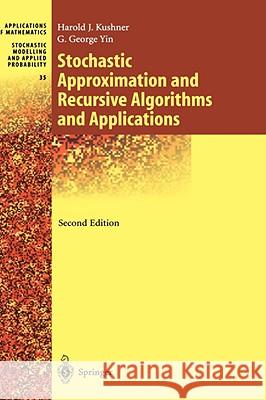Stochastic Approximation and Recursive Algorithms and Applications » książka
Stochastic Approximation and Recursive Algorithms and Applications
ISBN-13: 9780387008943 / Angielski / Twarda / 2003 / 478 str.
The basic stochastic approximation algorithms introduced by Robbins and MonroandbyKieferandWolfowitzintheearly1950shavebeenthesubject of an enormous literature, both theoretical and applied. This is due to the large number of applications and the interesting theoretical issues in the analysis of "dynamically de?ned" stochastic processes. The basic paradigm is a stochastic di?erence equation such as ? = ? + Y, where ? takes n+1 n n n n its values in some Euclidean space, Y is a random variable, and the "step n size" > 0 is small and might go to zero as n . In its simplest form, n ? is a parameter of a system, and the random vector Y is a function of n "noise-corrupted" observations taken on the system when the parameter is set to ? . One recursively adjusts the parameter so that some goal is met n asymptotically. Thisbookisconcernedwiththequalitativeandasymptotic properties of such recursive algorithms in the diverse forms in which they arise in applications. There are analogous continuous time algorithms, but the conditions and proofs are generally very close to those for the discrete time case. The original work was motivated by the problem of ?nding a root of a continuous function g (?), where the function is not known but the - perimenter is able to take "noisy" measurements at any desired value of ?. Recursive methods for root ?nding are common in classical numerical analysis, and it is reasonable to expect that appropriate stochastic analogs would also perform well.











